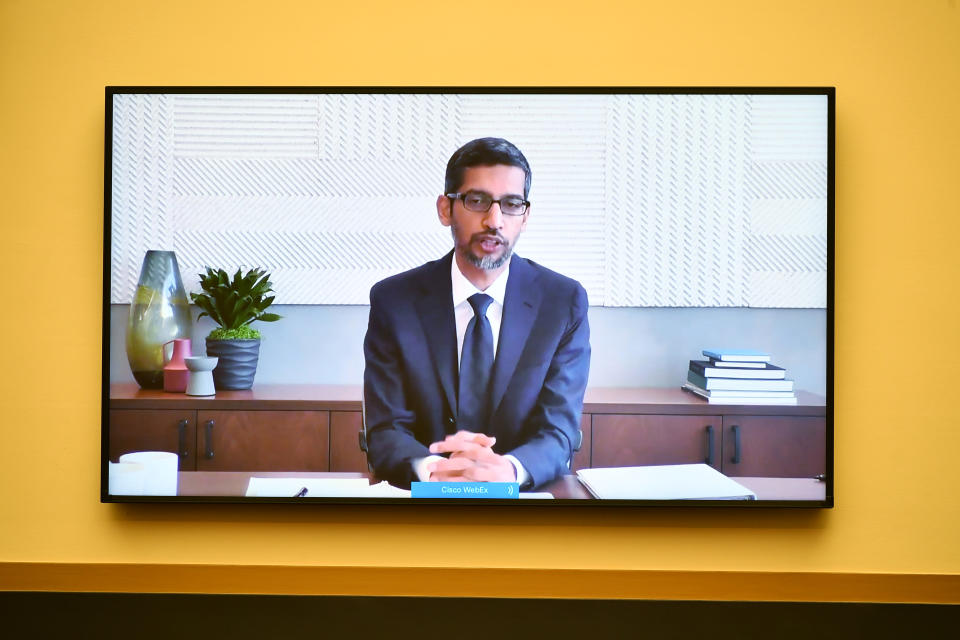Big Tech is still in trouble regardless of whether Trump or Biden wins
Wednesday, November 4, 2020
This article was first featured in Yahoo Finance Tech, a weekly newsletter highlighting our original content on the industry. Get it sent directly to your inbox every Wednesday by 4 p.m. ET. Subscribe
From antitrust to Section 230, Big Tech is in trouble
Election Day 2020 is over, but the ultimate outcome is far from certain. While supporters of President Donald Trump and former Vice President Joseph Biden believe their lives will be better if their candidate wins, Big Tech can’t say the same.
Because if there’s one thing Democrats and Republicans can agree on, it’s that Big Tech needs a gut check. That could come in the form of an antitrust crackdown, an overhaul of Section 230, a law that gives internet giants broad protections from legal liability, or both. Big Tech is in trouble no matter who takes office in January.
A bipartisan desire to make Big Tech smaller
While Biden and Trump have little in common, they’ve both attacked the market power of Big Tech. In September, Biden campaign spokesperson Matt Hill told the Wall Street Journal that many technology giants and their executives “not only abused their power, but misled the American people, damaged our democracy, and evaded any form of responsibility.”
“That ends with a President Biden,” he added.
Trump, for his part, has many beefs with Big Tech, including what he believes is an anti-conservative bias as well as a personal vendetta against Amazon (AMZN) CEO Jeff Bezos. But it’s notable that the Trump administration’s Justice Department went as far as to sue Google (GOOG, GOOGL) in October, alleging its search and search advertising businesses are illegal monopolies.

And according to Sally Hubbard, director of enforcement strategy at Open Markets Institute, that case will continue on regardless of who occupies the White House.
“The Department of Justice case against Google is an incredibly strong case. I don’t expect any change in administration to impact that case,” Hubbard told Yahoo Finance.
“If anything there could be additional claims added to the complaint, you know, a broadening of the scope of that case. But we’re already going to see that when the states bring their cases, which are expected in the coming weeks.”
Hubbard is referring to the collection of Democratic attorneys general (AGs) who, unlike a group of Republican AGs, didn’t sign onto the DOJs suit, but are expected to file their own suit and consolidate it with the original in the near future.
The antitrust scrutiny doesn’t end with Google, either. Investigators are sizing up cases against Amazon, Apple (AAPL), and Facebook (FB), as well. The Federal Trade Commission (FTC), along with AGs from New York and California, are probing the market power Amazon, one of the world’s largest e-commerce platforms with a market cap of $1.5 trillion, Bloomberg reported in August. Previously, an investigation from the Wall Street Journal claimed that Amazon used internal data on third-party retailers to create competing products.
Separate from Trump’s personal animus towards Bezos — whom he’s called Jeff “Bozo” — these probes will probably continue to dog the e-commerce giant.

Meanwhile, Facebook — whose CEO, Mark Zuckerberg, had a call in May with Trump that both sides called “productive” — still faces antitrust scrutiny over the power it wields with its 2.6 billion users. The FTC is reportedly nearing a decision over whether to sue Facebook over the way it scoops up competitors it views as a threat like Instagram and WhatsApp.
Even Apple, whose CEO, Tim Cook, gave Trump a tour of an Apple factory last year, can’t seem to catch a break. A revenue-sharing agreement between Apple and Google was at the heart of the recent antitrust lawsuit. While Apple wasn’t named as a defendant, that suit could hurt its bottom line if the Justice Department prevails. Meanwhile, in June, Politico reported that a group of state AGs and the Justice Department were taking steps towards launching an antitrust probe into Apple’s control over its app store, which takes a 30% cut from developers.
The DOJ and FTC are likely to keep pressing these matters no matter who wins the election.
It’s unlikely the companies will be forced to break up, but if they lose their suits, they may be ordered to change their business models, which could impact their bottom lines.
Everybody wants to change Section 230
But it’s not just the size of Big Tech that irks Republicans and Democrats alike — it’s what they get away with, especially through Section 230 of the Communications Decency Act. That law grants broad legal immunity to tech companies and lets them act in “good faith” to moderate content they find “objectionable.”
For all of the bluster from the Trump administration concerning Section 230, you’d think talk of making changes to the law was a nakedly partisan issue, but that’s far from the case. As Yahoo Finance’s Alexis Keenan has previously reported, Florida’s former consumer protection czar, Richard Lawson, has said there’s a “shocking level of bipartisan support” for reforming 230.

The Trump administration claims the law gives tech companies carte blanche to silence conservative voices on their platforms (despite no evidence of such claims), and wants to strip the platforms of their protections.
Democrats, meanwhile, have taken issue with the fact that Section 230 allows social platforms to avoid being held accountable for content they don’t remove. Biden in particular has said Facebook’s Section 230 protections should be “revoked, immediately.”
With both ends of the political spectrum calling for major changes to Section 230, Facebook, Google, and Twitter (TWTR), which depend on the law, could see big changes in 2021.
“I think we are going to start seeing more and more evidence that there was tremendous impact on our election from these business models that hyper target disinformation at people and allow for voter manipulation,” Hubbard said.
“So I think the pressure to rein in those business models is only going to increase, whether it’s coming from a view of being afraid of censorship or being afraid of misinformation the problem is the same and that’s too much control over speech by these monopoly platforms.”
And if new legislation is passed, expect those same firms to push back as much as possible to protect themselves and their livelihoods. After all, without comments from users, Facebook, Twitter, and Google’s YouTube are, well, pretty pointless.
By Daniel Howley, tech editor. Follow him at @DanielHowley
More Tech News
California’s Prop. 22 removes a ‘dark cloud’ for the likes of Uber and Lyft
California voters embrace legal exemptions for Uber and Lyft
Why this top Wall Street economist can't rule out a post 2020 election recession
Will.i.am: 'Technology with no regulations is scary as hell'
—
Sign up for Yahoo Finance Tech newsletter
Read the latest financial and business news from Yahoo Finance
Follow Yahoo Finance on Twitter, Facebook, Instagram, Flipboard, LinkedIn,YouTube, and reddit.


